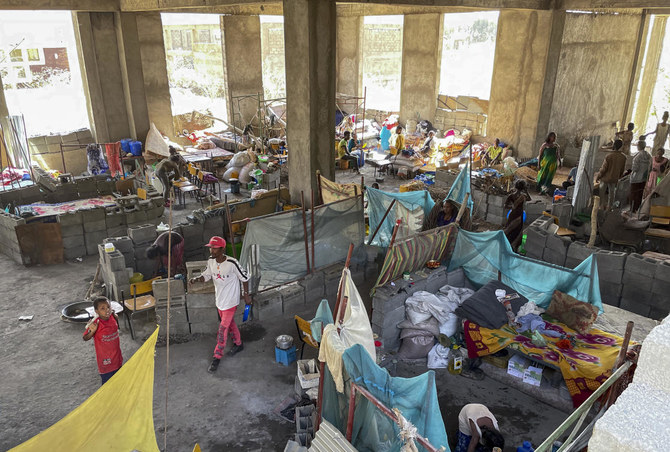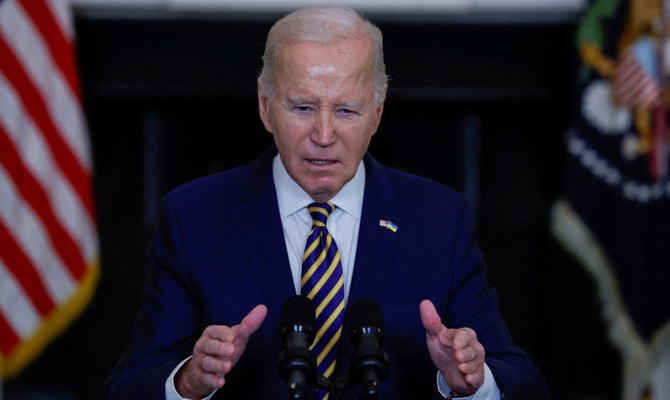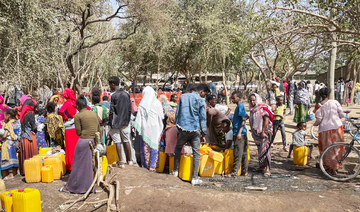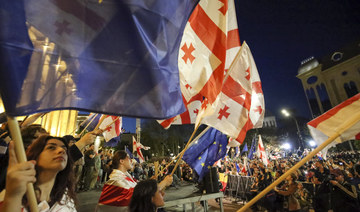KAMPALA: The humanitarian group Doctors Without Borders said Monday that health facilities in Ethiopia’s embattled region of Tigray have been “looted, vandalized and destroyed in a deliberate and widespread attack.”
The group said nearly 70% of 106 health facilities surveyed from mid-December to early March had been looted and more than 30% had been damaged. It said only 13% were functioning normally.
The findings deepen concern for the wellbeing of Tigray’s 6 million people. Fighting persists as government forces and their allies — including fighters reportedly from neighboring Eritrea — hunt down the region’s fugitive leaders.
Prime Minister Abiy Ahmed faces pressure to end the war. US Secretary of State Antony Blinken said last week that some of the atrocities in Tigray amount to “ethnic cleansing.”
According to Doctors Without Borders, health facilities in most areas “appear to have been deliberately vandalized to render them nonfunctional.” One-fifth of the health facilities were occupied by soldiers and few health facilities now have ambulances after most were seized by armed groups.
Group reports health facilities looted in Ethiopia’s Tigray
https://arab.news/vpzyq
Group reports health facilities looted in Ethiopia’s Tigray

Extreme heat shuts schools for millions, widening learning gaps worldwide

- Bangladesh, Philippines, India announce school closures
- High temperatures slow down the brain’s cognitive functions, lowering pupils’ ability to retain and process information: study
Hena Khan, a grade nine student in Dhaka, has struggled to focus on her studies this week as temperatures surpassed 43 degrees Celsius (109 degrees Fahrenheit) in the Bangladesh capital.
“There is no real education in schools in this punishing heat,” she said. “Teachers can’t teach, students can’t concentrate. Rather, our lives are at risk.”
Khan is one of more than 40 million students who have been shut out of classrooms in recent weeks as heatwaves have forced school closures in parts of Asia and North Africa. As the climate warms due to the burning of fossil fuels, heatwaves are lasting longer and reaching greater peaks.
In turn, government authorities and public health experts across the world are increasingly grappling with whether to keep students learning in hot classrooms, or encourage them to stay home and keep cool.
Either decision has consequences. About 17 percent of the world’s school-aged children are already out of school, according to United Nations data, but the proportion is much larger in developing countries with nearly a third of sub-Saharan Africa’s children out of school compared to just 3 percent in North America.
Child test scores in the developing world also lag developed countries.

Heat could exacerbate inequalities, widening learning gaps between developing nations in the tropics and developed countries, experts told Reuters, and even between rich and poor districts in wealthy countries. But sending children to overheated schools could make them ill.
South Sudan already this year closed its schools to some 2.2 million students in late March when temperatures soared to 45 degrees Celsius (113 Fahrenheit). Thousands of schools in the Philippines and in India followed suit in late April, closing classrooms to more than 10 million students.
On Wednesday, Cambodia ordered all public schools to slash two hours off the school day due to avoid peak heat at midday.
Meanwhile, Bangladesh has wavered between opening and closing schools for some 33 million students amid pressure to prepare pupils for exams — even as temperatures climb to dangerous levels.
Many Bangladeshi schools “don’t have fans, the ventilation is not good, and they might have tin roofing which does not provide good insulation,” said Shumon Sengupta, Bangladesh country director for nonprofit Save the Children.
Hot heads
Even if students continue attending classes during heatwaves, their education is likely to suffer.
High temperatures slow down the brain’s cognitive functions, lowering pupils’ ability to retain and process information. US high schoolers, one 2020 study found, performed worse on standardized tests if they were exposed to higher temperatures in the year leading up to the exam.
The research, published in the American Economic Journal, found that a 0.55C (1F) warmer school year reduced that year’s learning by 1 percent. Much of that impact disappeared in schools that had air conditioning, said study co-author Josh Goodman, an economist at Boston University.
Between 40 percent and 60 percent of US schools are thought to have at least partial air conditioning, according to various surveys. Schools without it are often found in poorer districts which already trail their wealthier counterparts academically.
Goodman and his colleagues found similar learning outcomes tied to heat when they looked at standardized test data in other countries. “When (students in) these places experience a year with more heat, they appear to have learned less,” he said.
Other research suggests excessive heat in the tropics can also impact a child’s education even before birth.
Children in Southeast Asia exposed to higher-than-average temperatures in utero and early in life obtained fewer years of schooling later in life, a 2019 study in the Proceedings of the National Academy of Sciences found.
All of this is worrying, Goodman said, because as the world warms, already hot countries shifting to an extremely hot climate will suffer more than temperate countries.
“Climate change will widen the learning gaps between hot and cool countries,” Goodman said. Some developed countries are trying to address the issue.
In March, the US Agency for International Development (USAID) announced it would build 30 heat-resilient schools in Jordan by 2026 “to address the projected increase in extreme heat days in Jordan,” a USAID spokesperson said.
Providing details not previously reported, USAID said it would invest $8.17 million in the schools, using passive cooling systems and air conditioning to help keep schools operating. The number of days that schools are closed for extreme heat has been ticking up in the US, but few countries track such data.
US schools are now canceling class for an average of six to seven school days each year for heat, compared with about three to four days a decade ago, said Paul Chinowsky, a civil engineer who led a 2021 study on schools and rising temperatures for the firm Resilient Analytics.
In Bangladesh last year, schools were closed for 6-7 days, said Save the Children’s Sengupta. “But this year, they are saying it might be closed for 3 to 4 weeks,” he said, as May is often the hottest month in South Asia.
Pro-Palestinian banners. Blazing Olympic rings. Workers’ May Day rallies confront turbulent times

ISTANBUL: Workers and activists around the world marked May Day with largely peaceful protests Wednesday over rising prices, low wages and calls for greater labor rights. Pro- Palestinian sentiments were also on display.
Police in Istanbul used tear gas and fired rubber bullets to disperse thousands of people who tried to break through a barricade and reach the main Taksim square in defiance of a ban. Interior Minister Ali Yerlikaya said at least 210 people were detained.
President Recep Tayyip Erdogan’s government has long declared Taksim off-limits for demonstrations on security grounds. In 1977, unidentified gunmen opened fire on a May Day celebration there, causing a stampede and killing 34 people. On Wednesday, a small group of trade union representatives lay a wreath at a monument to victims.
May Day, which falls on May 1, is observed to celebrate workers’ rights. It’s also an opportunity to air economic grievances or political demands. “Tax the rich,” one banner in Germany read. “Don’t touch the eight-hour workday!” another read in Sri Lanka.
In Paris, police fired tear gas as thousands of protesters marched through the French capital, seeking better pay and working conditions. Police said 12 officers were hospitalized after a homemade explosive was set off on the sidelines of the march and at least 45 people were detained after instances of scattered violence
A group of protesters set makeshift Olympic rings on fire to show discontent with the Summer Games that start in less than three months. France’s unions have warned of a strike during the Games if the government does not adequately compensate people forced to work during summer holidays.
Pro-Palestinian groups joined the Paris rally, chanting slogans in support for people in Gaza. There were similar scenes in other parts of the world. In Greece, pro-Palestinian protesters joined May Day rallies, waving a giant Palestinian flag as they marched past the Greek parliament. Others displayed banners in support of pro-Palestinian protesting students in the United States.
“We want to express our solidarity with students in the United States, who are facing great repression of their rights and their just demands,” said Nikos Mavrokefalos at the march. “We want to send a message that workers say no to exploitation, no to poverty, no to high prices,” he added.
Several thousand protesters joined the Athens marches as labor strikes disrupted public transport across Greece. The largest union demands a return to collective bargaining after labor rights were scrapped during the 2010-18 financial crisis.
In the German capital, around 11,600 people marched through the immigrant neighborhoods of Kreuzberg and Neukoelln, waving Palestinian flags and holding banners that read “No weapons for Israel” or “Free Palestine,” German news agency dpa reported.
Throughout Latin America, workers marched to protest austerity measures and demand higher wages. In Argentina, unions galvanized crowds to vent their rage over libertarian President Javier Milei’s economic policies, which they say benefit the wealthy while inflicting pain on the poor and middle class.
“Paying rent is difficult, buying rice is difficult, everything under this guy (Milei) is difficult,” said 40-year-old garbage collector Leandro Rosas, trailing protesters down the street with a broom because this May Day, he said he couldn’t even surrender a shift’s pay.
Meanwhile, Bolivian President Luis Arce joined the workers’ march and decreed a 5.8 percent increase in the national minimum wage, a bid to mobilize support as a worsening economic crisis raises the specter of social unrest. The thousands-strong protests in Santiago, Chile, turned violent in some areas as security forces unleashed water cannons and tear gas on corwds, drenching and dispersing protesters who vandalized shops and government buildings.
In Brazil, President Luiz Inácio Lula da Silva ratified a law that extends income tax exemptions to those earning up to two minimum wages per month, or about $544.
“In our country there will be no tax breaks to favor the richest, but to favor those who work and live off their wages,” Lula told a crowd sweltering in the sun at a soccer stadium in São Paulo.
In Nigeria, where inflation is the highest in 28 years, at over 33 percent, unions demanded bigger salary increases. In South Africa, pro-Palestinian demonstrators joined May Day events and in Kenya, President William Ruto called for an increase in the country’s minimum wage.
In Lebanon, pro-Palestinian marchers mingled with workers demanding an end to a miserable economic crisis. “Politicians do not feel the pain of the worker or the economic conditions,” said one demonstrator, Abed Tabbaa. In Iraq, protesters demanded better wages, the reopening of closed factories and the end to privatization of certain businesses.
Tens of thousands Sri Lankans paraded through the capital as the country struggles through its worst economic crisis, two years after declaring bankruptcy. Discontent has grown over efforts to increase revenue by raising the price of electricity and imposing taxes on professionals and small businesses.
In South Korea’s capital, thousands of protesters shouted pro-labor slogans at a rally that organizers said was meant to step up criticism of what they call anti-labor policies pursued by President Yoon Suk Yeol’s conservative government.
“In the past two years under the Yoon Suk Yeol government, the lives of our laborers have plunged into despair,” Yang Kyung-soo, leader of the Korean Confederation of Trade Unions, said in a speech. Union members criticized Yoon’s recent veto of a bill aimed at limiting companies’ rights to seek compensation for damages caused by union strikes.
In Japan, more than 10,000 people gathered in Tokyo, demanding salary increases to set off price increases.
Indonesian workers demanded protections for migrant workers abroad and a minimum wage raise. They gathered amid a tight police presence, chanting slogans against the new Job Creation Law and loosened outsourcing rules.
In the Philippines, hundreds of workers and left-wing activists marched to demand wage increases and job security amid soaring food and oil prices. Riot police stopped them from getting close to the presidential palace.
Biden blames China, Japan and India’s economic woes on ‘xenophobia’

- Concern about irregular migration has become a top issue for many US voters ahead of November’s presidential election
WASHINGTON: President Joe Biden said on Wednesday that “xenophobia” from China to Japan and India is hobbling their growth, as he argued that migration has been good for the US economy.
“One of the reasons why our economy’s growing is because of you and many others. Why? Because we welcome immigrants,” Biden said at a Washington fundraising event for his 2024 re-election campaign and marking the start of Asian American, Native Hawaiian and Pacific Islander Heritage Month.
“Why is China stalling so badly economically, why is Japan having trouble, why is Russia, why is India, because they’re xenophobic. They don’t want immigrants. Immigrants are what makes us strong.”
The International Monetary Fund forecast last month that each country would see its growth decelerate in 2024 from the year prior, ranging from 0.9 percent in highly developed Japan to 6.8 percent in emerging India.
They forecast that the United States would grow at 2.7 percent, slightly brisker than its 2.5 percent rate last year. Many economists attribute better-than-expected performance partly to a migrants expanding the country’s labor force.
Concern about irregular migration has become a top issue for many US voters ahead of November’s presidential election.
Biden, who has condemned the rhetoric of his Republican opponent Donald Trump as anti-immigrant, has worked to court broad economic and political relations with countries including Japan and India to counter China and Russia globally.
Trump blasts Biden in rare day on campaign trail

WAUKESHA, US: Donald Trump used a break in his hush money trial to stage back-to-back appearances in two Midwestern battleground states Wednesday — but kept his legal woes front-and-center as he accused President Joe Biden of weaponizing the courts against him.
The former Republican president, who is running for a return to the White House, rallied supporters in Wisconsin and Michigan, among the most hotly contested states in his expected rematch with Democrat Biden in November.
The speeches featured all of Trump’s go-to set-pieces, from complaints about environmentally friendly household appliances to apocalyptic warnings of a looming world war — but his evening speech in Michigan was notable for its vitriol.
“Every single thing he touches turns to shit,” Trump said of Biden in a speech in Freeland, Michigan peppered with profane language about his criminal charges, his 2020 election defeat and his determination to win reelection in November.
Trump had already spoken in an afternoon rally in the Wisconsin town of Waukesha, where he railed against Biden’s handling of the economy and immigration.
In both appearances he accused Democrats of “executing” newborn babies as he turned to the deeply divisive issue of abortion rights, and in both he revived baseless claims that Biden is behind the 88 felony charges he is facing.
“I’ve got to do two of these things a day,” he told a sea of red hats at his Michigan rally.
“You know why? Because I’m in New York all the time with the Biden trial — a fake trial that all of the legal scholars say is a disgrace,” he said in Michigan.
Trump regularly claims that his indictments — three for alleged cheating in elections and one for hoarding classified documents — are being orchestrated as part of a political witch hunt, but never offers any evidence.
The 77-year-old tycoon used his rare day on the stump to project his preferred image as a confident, seasoned campaigner, far from the Manhattan courtroom where he is accused of covering up payments to a porn star before the 2016 presidential election.
Trump is the first former US president to face criminal charges, and the trial appears to have annoyed him to no end.
For two weeks he has been sitting through long hours of witness testimony, visibly bored and angry at no-nonsense Judge Juan Merchan, who required him to be present — and then imposed a gag order prohibiting Trump from publicly attacking witnesses, jurors or court staff.
Before and after each day’s proceedings, Trump has been addressing journalists outside, venting about his legal problems, the US economy, his wife’s birthday and the “freezing” temperature inside the courtroom.
“He hates being there in court, where he is just another criminal defendant,” political expert Larry Sabato from the University of Virginia told AFP. “He has no control and is not in charge.”
Biden’s campaign has not missed a chance to bait his opponent over his legal troubles — referring to Trump as “Sleepy Don” after reports from the courtroom that the Republican was nodding off during the proceedings.
The nickname evoked the “Sleepy Joe” taunt Trump has long used for Biden.
Biden has advanced in the polls since March, with the two candidates now running neck and neck.
But Trump and his supporters hope to harness the media attention surrounding the trial to fire up his base, and push his message that Democrats are destroying the country through negligence on border security and poor economic stewardship.
In Waukesha, the former president accused Biden of being too passive on the pro-Palestinian student demonstrations that have convulsed college campuses nationwide, and of allowing the country to be “invaded” by migrant hordes.
Although Trump is energized by his campaign rallies, he had not held a single one since the start of his trial on April 15, with the only planned event canceled due to weather.
“I have come here today from New York City where I’m being forced to sit for days on end in a kangaroo courtroom with a corrupt and conflicted judge enduring a Biden Sideshow trial at the hands of a Marxist district attorney,” he complained in Michigan.
Georgian police disperse protesters as parliament approves ‘foreign bill’ on second reading

- 11 people, including six police officers, were injured after Wednesday’s altercations, say health ministry officials
- Critics have dubbed the bill “the Russian law,” saying it is inspired by laws used to suppress dissent in Vladimir Putin’s Russia
TBILISI: Georgia’s parliament on Wednesday approved the second reading of a bill on “foreign agents” that has been criticized as Kremlin-inspired, as police fired tear gas and stun grenades to clear a large crowd of protesters opposed to the draft law.
The bill, which would require organizations receiving more than 20 percent of their funding from abroad to register as agents of foreign influence, has sparked a rolling political crisis in the South Caucasus country.
Ever-growing numbers of protesters have been taking to the street nightly for almost a month, with a heaving crowd tens of thousands strong shutting down central Tbilisi on Wednesday, the largest anti-government demonstration yet.
Georgia’s Health Ministry, in a bulletin quoted by Georgian media, said 11 people, including six police officers, had received hospital treatment after Wednesday’s altercations.
Deputy Interior Minister Aleksandre Darakhvelidze, quoted by Georgian media, said protesters had tried to push their way into parliament using various objects and were attacking policemen.
Darakhvelidze said police action on Tuesday resulted in 63 arrests and six police officers injured.
President says to look to the election
Georgian President Salome Zourabichvili, who opposes the bill but has only largely ceremonial powers, told protesters in a video posted on social media to show restraint. The real task, she said, was to oust the government in an October election.
“Our fate will not be determined by this law,” she said in comments quoted by media. “This fight will take place in the forthcoming parliamentary election after which (this) law and many others will be rescinded.”
Georgian media cited the country’s Orthodox Church, one of its most respected institutions, as calling for the government and protesters to hold talks to resolve a “political crisis.”
Protester Sergi Kapanadze said that for him the protest movement amounted to a struggle for Georgia’s national survival.
“What are we afraid of more?” he told Reuters. “Being gassed, being beaten up, or losing the country?“
Georgian critics have dubbed the bill “the Russian law,” saying it is inspired by laws used to suppress dissent in Vladimir Putin’s Russia. Russia is unpopular among many citizens of Georgia, which lost a brief war with Moscow in 2008.
Both the head of the European Commission, Ursula von der Leyen, and the EU’s foreign policy chief, Josep Borrell, condemned the violence. The EU gave Georgia candidate member status in December but has said the bill could halt its integration into the bloc.
Police cleared the crowd by the parliament building using tear gas and stun grenades fired from within the fortress-like complex. Water cannon were also deployed.
Protesters regrouped, with some lighting a bonfire outside parliament, and others attempting to build makeshift barricades to block key roads. A Reuters eyewitness saw at least one man carried away from the action, his face bloodied.
The protests have pitched the ruling Georgian Dream party against a coalition of opposition parties, civil society groups, celebrities and the president.
Parliament, controlled by Georgian Dream and its allies, voted to advance the bill, prompting a boos from protesters outside. The bill must pass one more vote before becoming law.
Wednesday’s parliamentary debate was tense, with opposition members expelled and scuffles between legislators, a not uncommon occurrence in Georgia’s often-rowdy parliament.
One pro-government deputy was seen throwing a book at opposition legislators, while others shouted and physically confronted opponents.
Levan Khabeishvili, leader of the United National Movement party, Georgia’s largest opposition bloc, spoke in parliament with his face heavily bandaged. His party said he was beaten by police at the previous day’s protest, leaving him with concussion, broken facial bones, and missing four teeth.
The bill’s supporters, including Bidzina Ivanishvili, the billionaire founder of Georgian Dream and former prime minister, say the law would bolster sovereignty amid what he said were Western attempts to pit Georgia against Russia.



















